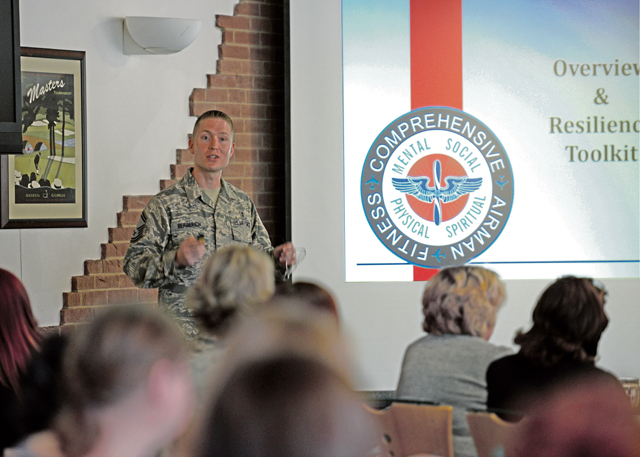
“If you fall, get back up. That is the whole idea behind resilience,” Anderson said.
Jan Devitt, 86th Airlift Wing community support coordinator, organized the event with the help of the Ramstein Master Resilience Trainers and the goal to provide spouses with information and tools taught to Airmen, assisting in their resilience development.
“Every day, MRTs are conducting resilience training for active-duty Airmen, but we were missing a big part, which are the spouses,” said Senior Master Sgt. Joseph Berberich, 86th Medical Group clinical engineering superintendent and lead master resilience trainer. “Providing this training really completes the resilience training because it allows Airmen and their spouses to understand the same thought processes and speak the same language.
“Resilience is important because every day we face challenges and try to manage stressors in our lives, but with resilience, we are able to turn these every day negative things into positive outcomes we can learn and grow from,” Berberich continued.
Berberich noted that the resilience tools MRTs teach are directly related to Comprehensive Airman Fitness, the Air Force program that links resilience to maintaining mental, physical, social and spiritual fitness.
“The four pillars of CAF are interrelated and complimentary to each other and the social support network is critical to what we teach,” Berberich said. “Having someone to reach out to when you are having a bad day and feeling negative is really important.
“Negative things compound on themselves almost like a star about to go supernova,” Berberich continued. “The bad things build up until they eventually explode. Positive emotions help counteract those effects, and that is why we try to teach people how to look at the positives and focus on the good things while dealing with the negatives.”
For spouses such as Anderson, having a social support network is invaluable to maintaining resilience.
“This resilience training will help prevent negative events in our lives from keeping us down,” Anderson said. “If you keep letting the bad things build up, you’re going to eventually burn out. Fortunately, we have a good network of support here and this training will help make us stronger.”
Anderson added that one member of her social support network, Rebecca Caputo, 86th VRS key spouse, has been a positive force in her life, which has helped her be resilient.
“Life can really drag you down sometimes,” Caputo said. “Your husband could be deploying, you have bills coming up, the kids are acting out … all these things can build up on your day, but being able to work through these things and change it so that it is not so negative can make life a lot easier for a spouse and a military family as a whole.
“Resilience is especially important for a key spouse because we need to be the positive force for our family and friends,” Caputo continued. “Keeping a positive mindset keeps you from getting depressed and helps you focus on the good things in life while helping others do the same.”


